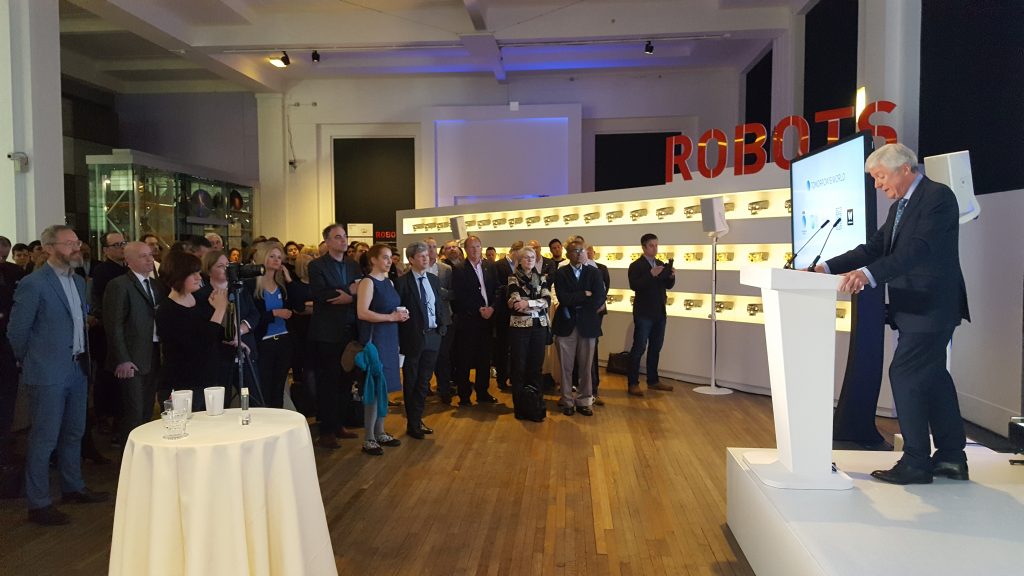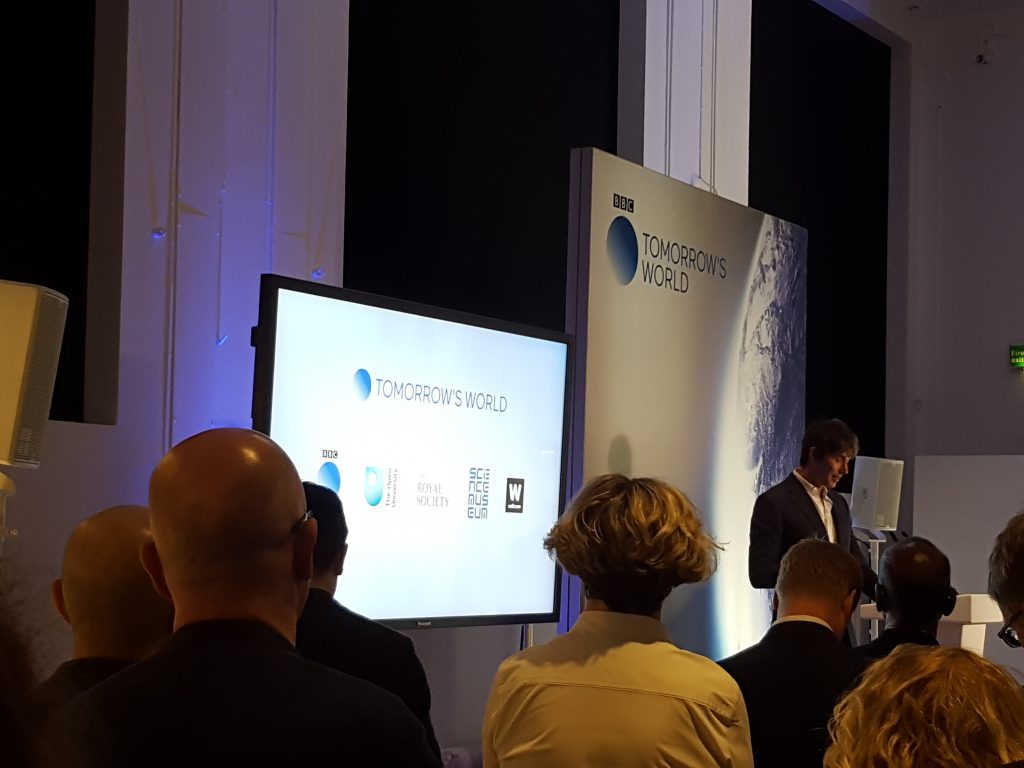Today marked a memorable day for science and culture as representatives from five great British institutions joined forces in the Science Museum to announce the relaunch of the vintage science brand Tomorrow’s World, reimagined for the 21st century. Digital Content Manager Pip Moss talks us through this exciting partnership and what we can expect from it.
In the making today, we bring you #TW2017 – life’s big questions answered! ? pic.twitter.com/nrvifWTLd6
— Tomorrow’s World (@TWBBC) May 2, 2017
Tomorrow’s World has arrived
The announcement of the rebooted Tomorrow’s World marked the culmination of discussions over the past year between an unprecedented partnership of the BBC, represented at the launch by Director General Tony Hall, and the Science Museum Group, represented by Director Ian Blatchford, along with the Royal Society, Wellcome Trust and Open University.
For those who remember the original Tomorrow’s World, a flagship BBC TV series that ran for nearly 40 years, this news may bring back nostalgic memories of presenters like Raymond Baxter, Maggie Philbin or Carmen Pryce showcasing revolutionary inventions that were hoped to change our world. It was described as television trying to predict the future of science, and it did a pretty good job of doing so.
More than fifty years on from the first broadcast and the world has changed, not least because of the rise of the internet. And what we want science communication to accomplish has changed too. We no longer want to just reveal new science to those who are already engaged and watching, we want to inspire and empower everyone – whoever and wherever they are. By questioning our lives and searching for answers, we are all researchers.
That’s why for the past year, myself and other representatives from the partners involved have worked together on this shared ambition, and using the Tomorrow’s World identity, we now seek to launch Britain’s biggest engagement project this June.
Across digital, broadcast and our partners’ channels, we aim to capture the attention of new audiences, inspire curiosity and ignite national conversations. This is just the start though; we hope to see more people and institutions join over time to ensure it continues well into the future.

This morning’s event opened with BBC Director-General Tony Hall revealing these shared ambitions and our quest to “…make the UK the very best place in the world to do science and to equip all of us with the knowledge and understanding we need to make sense of our lives”. For the campaign that will support the Tomorrow’s World vision, he announced at least 40 hours of TV (including Britain’s Greatest Inventions that sees the Science Museum’s Wroughton site play a starring role), a series of hyper-contemporary podcasts, live events, and at the centre of it all, a digital hub:
“For the first time ever, Britain will have a digital space where the best of UK science can work together and showcase its work together.… committing to make science more relevant, more accessible and more personal to each of us.”
Tony Hall, BBC Director-General

Brian Cox, The Royal Society Professor for Public Engagement in Science, then followed, focusing on the importance and necessity of the Tomorrow’s World campaign for today’s society. Quoting Jacob Bronowski , who did the landmark BBC series The Ascent of Man in 1973, and asking “who should fight for Britain to be the best place to do science”, Cox suggested that this responsibility falls to all science establishments and education centres, and to the BBC “as the bridge to all citizens”.
UCL mathematician and BBC science communicator Hannah Fry described how her journey into maths was first inspired by trips to the Science Museum (“my spiritual home”), aged 11, and how her love for it lives on because “it helps you see the world in a very new light”. Adding to this empowering illustration of science knowledge, Fry eluded to the need for us to “open up the conversation”, before finishing with her involvement in the BBC2 live broadcast of Britain’s Greatest Inventions.
And finally, before the 100 plus press and key opinion formers in attendance entered our Robots exhibition to learn more, our very own director Ian Blatchford took to the stage to share highlights from our own plans, which beyond digital and broadcast includes a space-themed Tomorrow’s World Lates in August, and our intention to rename our ‘Antenna’ gallery ‘Tomorrow’s World’.
“The Tomorrow’s World partnership is already bearing fruit with Britain’s Greatest Inventions, a 90-minute live broadcast from our stores that will air on BBC Two….And renaming our contemporary science gallery ‘Tomorrow’s World’ shows our true commitment to this partnership.”
Ian Blatchford, Director of the Science Museum
What is #BritainsGreatestInvention? Coming soon to @BBCTwo #TW2017 ? pic.twitter.com/dw6Em0T7ZF
— Tomorrow’s World (@TWBBC) May 2, 2017
Stood before them at the event were a number of leading lights in science communication, including: Sir Venki Ramakrishnan, Royal Society; Dr Simon Chaplin, Wellcome Director of Culture & Society; Mark Brandon, Open University; Katherine Mathieson, Chief Executive, British Science Association; Prof Gail Cardew, Royal Institution; Prof Jim Al-Khalili, University of Surrey; Dr Helen Czerski, UCL; Prof Jon Butterworth, UCL; Prof Nicola Clayton, University of Cambridge; Dr Robin Lovell-Badge, The Francis Crick Institute; Daniel Glaser, Director of Science Gallery London; Sinead Rocks, Head of BBC Learning; Dr Michael Mosley, TV broadcaster; Andrew Cohen, BBC Head of Science; Craig Hunter, BBC Factual Commissioning Editor; Alison Kirkham, BBC Controller of Factual Commissioning; James Purnell, BBC Director of Radio; Deborah Cohen, BBC Editor Science Radio; David Shukman, BBC Science Editor; Mohit Bakaya, BBC Commissioning Editor, Radio 4; Clive Cookson, Science Editor, Financial Times; Dr Kevin Fong, Consultant Anaesthetist and Science Communicator; James Wong, Botanist and science writer; and Liz Bonnin, broadcaster and biochemist.
Tomorrow’s World provides a fantastic platform for the Science Museum Group’s dedicated contemporary science teams to share the inventions and innovations that are shaping our future with a wider and more diverse audience.
The intention to rename our interactive ‘Antenna’ gallery ‘Tomorrow’s World’ will recapitulate a relationship between the BBC, Wellcome and Science Museum when the gallery was first unveiled in 2000 by HM the Queen.
But as a group of museums with a collection of over 7 million objects of historical significance, we understand it’s important to look back at where we’ve come from too. Our curators will help reveal the stories from our past and by doing so bring context to our lives today, enabling us to learn from any mistakes and ensure we’re steering our future in the right direction.
Example Science Museum film produced for Tomorrow’s World
Human ingenuity is precious and unique and as long as we keep inspiring curiosity in all and supporting diversity, we’ll continue to find innovative solutions across science, technology, medicine and beyond, to build together what we hope will be an even better world tomorrow.
Follow @TWBBC to keep up with what’s going on.